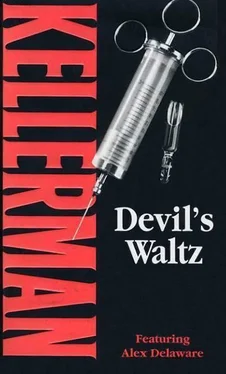Jonathan Kellerman - Devil's Waltz
Здесь есть возможность читать онлайн «Jonathan Kellerman - Devil's Waltz» весь текст электронной книги совершенно бесплатно (целиком полную версию без сокращений). В некоторых случаях можно слушать аудио, скачать через торрент в формате fb2 и присутствует краткое содержание. Город: London, Год выпуска: 1992, ISBN: 1992, Издательство: Little Brown, Жанр: Триллер, на английском языке. Описание произведения, (предисловие) а так же отзывы посетителей доступны на портале библиотеки ЛибКат.
- Название:Devil's Waltz
- Автор:
- Издательство:Little Brown
- Жанр:
- Год:1992
- Город:London
- ISBN:978-0-316-90289-2
- Рейтинг книги:5 / 5. Голосов: 1
-
Избранное:Добавить в избранное
- Отзывы:
-
Ваша оценка:
- 100
- 1
- 2
- 3
- 4
- 5
Devil's Waltz: краткое содержание, описание и аннотация
Предлагаем к чтению аннотацию, описание, краткое содержание или предисловие (зависит от того, что написал сам автор книги «Devil's Waltz»). Если вы не нашли необходимую информацию о книге — напишите в комментариях, мы постараемся отыскать её.
Devil's Waltz — читать онлайн бесплатно полную книгу (весь текст) целиком
Ниже представлен текст книги, разбитый по страницам. Система сохранения места последней прочитанной страницы, позволяет с удобством читать онлайн бесплатно книгу «Devil's Waltz», без необходимости каждый раз заново искать на чём Вы остановились. Поставьте закладку, и сможете в любой момент перейти на страницу, на которой закончили чтение.
Интервал:
Закладка:
“Buying real estate?”
“Buying and selling. Investing. He even had a house in France for a short while. Very old — a château. A duke bought it and told everyone it had been in his family for hundreds of years. Larry laughed at that — he hated pretentiousness. But he did love the buying and selling. The freedom it brought him.”
I understood that, having achieved some financial independence myself by riding the land boom of the mid-seventies. But I’d operated on a far less exalted level.
“Upstairs,” she said, “is all empty.”
“Do you live here by yourself?”
“Yes. No children. Please — have an orange. They’re from the tree in back, quite easy to peel.”
I picked up an orange, removed its rind, and ate a segment. The sound of my jaws working seemed deafening.
“Larry and I don’t know many people,” she said, reverting to the present-tense denial of the brand-new mourner.
Remembering her remark about my arriving earlier than expected, I said, “Is someone from the hospital coming out?”
She nodded. “With the gift — the certificate of the donation to UNICEF. They’re having it framed. A man called yesterday, checking to see if that was all right — giving to UNICEF.”
“A man named Plumb?”
“No... I don’t believe so. A long name — something German.”
“Huenengarth?”
“Yes, that’s it. He was very nice, said kind things about Larry.”
Her gaze shifted, distractedly, to the ceiling. “Are you certain I can’t get you something to drink?”
“Water would be fine.”
She nodded and rose. “If we’re lucky, the Sparkletts man has come. Beverly Hills water is disagreeable. The minerals. Larry and I don’t drink it.”
While she was gone, I got up and inspected the paintings. Hockney verified. Watercolor still life in a Plexiglas box frame. Next to that, a small abstract canvas that turned out to be a De Kooning. A Jasper Johns word salad, a Jim Dine bathrobe study, a Picasso satyr-and-nymph gambol in China ink. Lots of others I couldn’t identify, interspersed with the earth-toned batiks. The wax pressings were tribal scenes and geometric designs that could have been talismans.
She returned with an empty glass, a bottle of Perrier, and a folded linen napkin on an oval lacquer tray. “I’m sorry, there’s no spring water. I trust this will be acceptable.”
“Of course. Thank you.”
She poured the water for me and took her seat again.
“Lovely art,” I said.
“Larry bought it in New York, when he worked at Sloan-Kettering.”
“The cancer institute?”
“Yes. We were there for four years. Larry was very interested in cancer — the rise in frequency. Patterns. How the world was being poisoned. He worried about the world.”
She closed her eyes again.
“Did the two of you meet there?”
“No. We met in my country — the Sudan. I’m from a village in the South. My father was the head of our community. I was schooled in Kenya and England because the big universities in Khartoum and Omdurman are Islamic and my family was Christian. The South is Christian and animist — do you know what that is?”
“Ancient tribal religions?”
“Yes. Primitive, but very enduring. The northerners resent that — the endurance. Everyone was supposed to embrace Islam. A hundred years ago they sold the southerners as slaves; now they try to enslave us with religion.”
Her hands tightened. The rest of her remained unchanged.
“Was Dr. Ashmore doing research in the Sudan?”
She nodded. “With the U.N. Studying disease patterns — that’s why Mr. Huenengarth felt the donation to UNICEF would be an appropriate tribute.”
“Disease patterns,” I said. “Epidemiology?”
She nodded. “His training was in toxicology and environmental medicine, but he did that only briefly. Mathematics was his true love, and with epidemiology he could combine mathematics with medicine. In the Sudan he studied the pace of bacterial contagion from village to village. My father admired his work and assigned me to help him take blood from the children — I’d just finished my nursing degree in Nairobi and had returned home.” She smiled. “I became the needle lady — Larry didn’t like hurting the children. We became friends. Then the Muslims came. My father was killed — my entire family... Larry took me with him on the U.N. plane, to New York City.”
She recounted the tragedy matter-of-factly, as if numbed by repeated insults. I wondered if exposure to suffering would help her deal with her husband’s murder when the pain hit full force, or would make matters worse.
She said, “The children of my village... were slaughtered when the northerners came. The U.N. did nothing, and Larry became angry and disillusioned with them. When we got to New York he wrote letters and tried to talk to bureaucrats. When they wouldn’t receive him, his anger grew and he turned inward. That’s when the buying started.”
“To deal with his anger?”
Hard nod. “Art became a kind of refuge for him, Dr. Delaware. He called it the highest place man could go. He would buy a new piece, hang it, stare at it for hours, and talk about the need to surround ourselves with things that couldn’t hurt us.”
She looked around the room and shook her head.
“Now I’m left with all of it, and most of it doesn’t mean much to me.” She shook her head again. “Pictures and the memory of his anger — he was an angry man. He even earned his money angrily.”
She saw my puzzled look. “Please excuse me — I’m drifting. What I’m referring to is the way he started. Playing blackjack, craps — other games of chance. Though I guess playing isn’t the right word. There was nothing playful about it — when he gambled he was in his own world, didn’t stop to eat or sleep.”
“Where did he gamble?”
“Everywhere. Las Vegas, Atlantic City, Reno, Lake Tahoe. The money he made there he invested in other schemes — the stock market, bonds.” She waved an arm around the room.
“Did he win most of the time?”
“Nearly always.”
“Did he have some kind of system?”
“He had many. Created them with his computers. He was a mathematical genius , Dr. Delaware. His systems required an extraordinary memory. He could add columns of numbers in his head, like a human computer. My father thought he was magical. When we took blood from the children, I had him do numbers tricks for them. They watched and were amazed, and didn’t feel the sting.”
She smiled and covered her mouth.
“He thought he could go on forever,” she said, looking up, “making a profit at the casinos’ expense. But they caught on and told him to leave. This was in Las Vegas. He flew to Reno but the casino there knew also. Larry was furious. A few months later he returned to the first casino in different clothing and an old man’s beard. Played for higher stakes and won even more.”
She stayed with that memory for a while, smiling. Talking seemed to be doing her good. That helped me rationalize my presence.
“Then,” she said, “he just stopped. Gambling. Said he was bored. Began buying and selling real estate... He was so good at it... I don’t know what to do with all this.”
“Do you have any family here?”
She shook her head and clasped her hands. “Not here or anywhere. And Larry’s parents are gone too. It’s so... ironic. When the northerners came, shooting women and children, Larry looked at them in the face and screamed at them, calling them terrible names. He wasn’t a big man... Did you ever meet him?”
I shook my head.
“He was very small.” Another smile. “Very small — behind his back my father called him a monkey. Affectionately. A monkey who thought he was a lion. It became a village joke and Larry didn’t mind at all. Perhaps the Muslims believed he was a lion. They never hurt him. Allowed him to take me away on the plane. A month after we got to New York , I was robbed on the street by a drug addict. Terrified. But the city never frightened Larry. I used to joke that he frightened it. My fierce little monkey. And now...”
Читать дальшеИнтервал:
Закладка:
Похожие книги на «Devil's Waltz»
Представляем Вашему вниманию похожие книги на «Devil's Waltz» списком для выбора. Мы отобрали схожую по названию и смыслу литературу в надежде предоставить читателям больше вариантов отыскать новые, интересные, ещё непрочитанные произведения.
Обсуждение, отзывы о книге «Devil's Waltz» и просто собственные мнения читателей. Оставьте ваши комментарии, напишите, что Вы думаете о произведении, его смысле или главных героях. Укажите что конкретно понравилось, а что нет, и почему Вы так считаете.












